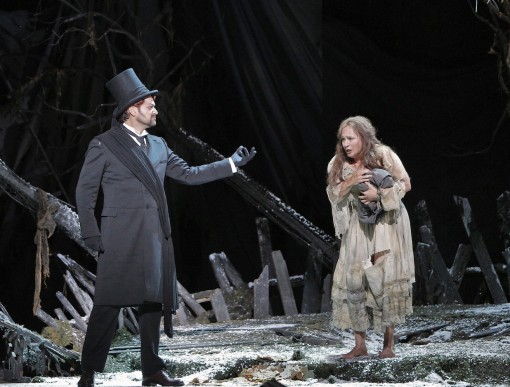Spectacle overwhelms the vocalism in San Francisco Opera’s season-opening “Mefistofele”

Ildar Abdrazakov in the title role and Patricia Racette as Margherita in San Francisco Opera’s production of Boito’s “Mefistofele.” Photo: Cory Weaver
Plagued by deficits and financial shortfalls in recent years, San Francisco Opera has been in something of an austerity mode. Seasons have been curtailed and some new ventures tabled.
General director David Gockley reached into one of the company’s most opulent vaults to open the company’s 91st season, reviving a glorious production of Arrigo Boito’s Mefistofele, first seen here in 1989 and revived in 1994, in what began as a joint venture with the Grand Théâtre de Genève. Canadian director Robert Carsen’s production has also been mounted by the Metropolitan Opera, Lyric Opera of Chicago and Houston Grand Opera. Revivals at the Met, which co-owns the production with San Francisco Opera, are due in 2015 and 2017.
For San Francisco in 2013, this spectacular (in all senses) staging restores the “grand” to grand opera in a timely and captivating way. By opening with this mighty Mefistofele, the company reawakens audiences to the scope, ambition, risks and rewards of this art form when nothing is held back.
Marshaling forces that include six principals, a chorus of 90, a 30-member children’s chorus, 12 ballet dancers and 45 supers, revival director Laurie Feldman and set and costume designer Robert Levine forged crowd scenes so vast and various that a viewer might well have suspected digital enhancement.
The first of these was the Prologue’s heavenly chorus. Gradually emerging like so many points of candlelight from behind a cloud-bedazzled scrim, the white-robed and gold-crowned singers were deployed across the stage and up into a towering wall of celestial theater boxes. That was a cunning piece of theatrical mirroring in a production full of theatrical framing devices, including a proscenium within the proscenium. By linking the War Memorial Opera House audience to those celestial witnesses on stage, the stakes were metaphorically and emotionally raised.
Moments later, the Act One Easter Sunday revelries featured confetti- and streamer-laced dancing, carousing, stilt-walking and a vivid bit of twerking that proved Miley Cyrus didn’t invent dirty dancing. More nudity, underscored by prosthetic body parts, heated up the Witches Sabbath.
Mefistofele is all about the forces of good and evil, the battle between the sacred and the profane set in motion when the opera’s eponymous anti-hero (bass Ildar Abdrazakov) draws Faust (tenor Ramón Vargas) into his fateful bargain. In Boito’s libretto, based on Goethe’s Faust drama, the action sprawls from heaven to hell, a garden for gamboling lovers to a sublimely becalmed ancient Greece. Some of what takes place is wooly, silly or stiffly ideological.
Touches of humor, to this production’s credit, leavened the mix. When Faust first took flight on Mefistofele’s time- and space-transporting cape, the tenor was hoisted on a rope that left him dangling like a puppet. Faust’s gigantic telescope trained a puny sky scored a visual point about the limits and folly of human striving. Mefistofele made his first entrance by a climbing of the orchestra pit on a red ladder.
Music is the essential engine that powers this sweeping voyage of body, heart and soul. With the exception of soprano Patricia Racette—superlative in two roles—the vitality of the evening flowed primarily from the pit and the chorus. Conductor and San Francisco Opera music director Nicola Luisotti led a richly colored, sensitively detailed and altogether thrilling account of this wonderful score. Anything that was demanded he and the musicians delivered – somber brass choirs, on stage and off; a string tone by turns ethereal and fleshy; expressive precision by the woodwinds; a spry Mozartean delicacy in the garden love scene; a Mahlerian abandon in the death scene of the grief-maddened Margherita.
Racette was gripping in that wintery descent of Faust’s ill-served lover, her voice ripe with despair and self-loathing before her moment of deliverance. Returning as Elena (Helen of Troy), Racette made a noble and serene impression, with a burnished vocal patina to match.
Abdrazakov, tall, bare-chested and regally charismatic in red satin suit, made a striking if somewhat mannered Mefistofele. But both his singing, a strong, yet inflexible column of sound that tended to vanish at the low end, and his gestures seemed a little too considered and calculated.
Vargas sounded pinched and constricted, a contrast made apparent in his early scene with tenor Chuanyue Wang’s limber turn as a student. It wasn’t until the action reached ancient Greece in Act Four that Vargas’ voice seemed to expand and bloom opposite Racette, but by then his Faust had failed to fully engage, either musically or dramatically.
It may not have been a uniformly strong night for the principals. But this all-stops-out Boito was a decisive win for San Francisco Opera. By the time the curtain came down, three and a half hours after the opening-night speeches ended, an exhilarating Mefistofele had taken the audience to heaven and hell and back again to the heights.
Mefistofele runs through October 2. sfopera.com
Steven Winn is a San Francisco arts writer and critic who spent 28 years at the San Francisco Chronicle. His work has appeared in Humanities, Manhattan, San Francisco Classical Voice, Symphony and elsewhere